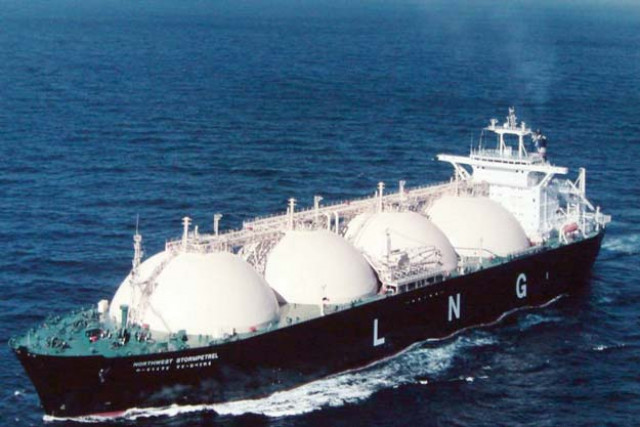LNG imports: Consumers to pay millions extra in margins, other costs
Gas utilities and PSO likely to receive $4-5 per mmbtu of LNG.

The determination and notification of LNG price would be made by Ogra in line with the practice in case of petroleum products including exchange rate adjustments. PHOTO: AFP
The government has decided to impose margins and other charges on the import of liquefied natural gas (LNG) in an attempt to collect millions of dollars from the consumers, which will also go into the pockets of business tycoons having major stakes in gas utilities.
These charges are being levied in order to recover different types of costs for which third-party access rules have been suspended. The previous government of Pakistan Peoples Party (PPP) had framed these rules, which only allowed the recovery of transmission fee for gas utilities.
Read: LNG carrier fails to meet policy standards
The new charges include collection of margins and other import-related costs by PSO, terminal charges under the LNG services agreement, cost of services for gas utilities – Sui Southern Gas Company (SSGC) and Sui Northern Gas Pipelines (SNGPL), recovery of administrative margins and transmission losses for the utilities and LNG freight charges.
With these margins and costs, around $4-5 per million British thermal units (mmbtu) will go into the pockets of gas utilities and state oil marketing company PSO.
According to officials, the Oil and Gas Regulatory Authority (Ogra) had opposed the collection of margins and costs by gas companies as their licences did not allow it. However, the Economic Coordination Committee (ECC) in its meeting held on June 6 gave the go-ahead for the recovery of different costs, setting aside concerns of the regulator.
Read: Unresolved issues: LNG negotiations with Qatar hit a snag
The ECC was told that a committee had discussed the proposals and legal aspects had been addressed. A draft notification to declare LNG a petroleum product and amend the Petroleum Products (Petroleum Levy) Ordinance 1961 has been sent to the Law Division.
Accordingly, the LNG pricing will be done in line with the prevailing mechanism for monthly revision in petrol and diesel rates. It was agreed that detailed policy guidelines on the LNG price would be issued separately.
Regarding the issue of non-operating income, the committee agreed that the cost of service (transmission and distribution) should be treated as operating income as it would not be expedient to charge it under this arrangement as well as part of normal revenue requirements. In line with the decision of the committee, the sponsoring ministry gave the proposals for the pricing of LNG.
Read: Precautionary steps: LNG terminal has highest level of safety
It was agreed that the determination and notification of LNG price would be made by Ogra in line with the practice in case of petroleum products including exchange rate adjustments.
However, the LNG price would be determined keeping in view the price of LNG cargoes scheduled to arrive in Pakistan in a month so that the rate reflected the actual cost of gas.
Moreover, PSO would be allowed to incorporate any difference between the actual and provisional prices in the subsequent pricing period. This will remove any ambiguity in the pricing mechanism and ensure that actual prices are received from the consumers. Gas infrastructure development cess will not be applicable to LNG imports.
After discussions, the ECC approved margins up to 4% of LNG price for PSO, which would be reviewed after three months. Administrative margins were set at $0.05 per mmbtu for SSGC and SNGPL, which will be paid in rupees and treated as non-operating income subject to review after three months. The remaining charges would be set by Ogra.
Published in The Express Tribune, June 21st, 2015.
Like Business on Facebook, follow @TribuneBiz on Twitter to stay informed and join in the conversation.



















COMMENTS
Comments are moderated and generally will be posted if they are on-topic and not abusive.
For more information, please see our Comments FAQ